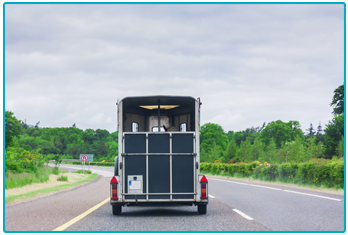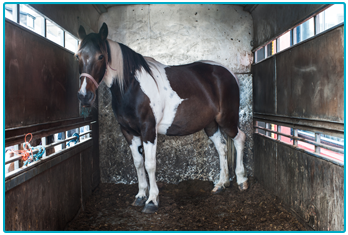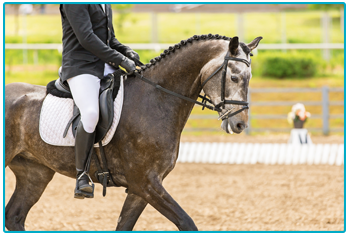Cheltenham festival heralds the advent of the equestrian competition season in the UK. From March through to the end of summer, horse riding enthusiasts around the country will be travelling to competitions in a number of disciplines such as showjumping, eventing and dressage. These are fantastic to watch and even more exciting to take part in and you may well find yourself transporting your horse to these events. If you do then there are a number of potential issues that you should be aware of. Read on and find out more in our horse health blog below.
Safety aspects

Making sure that your horse is comfortable and safe should be your primary concern before even thinking about travelling to competitions. A suitable lorry or trailer should be selected, one that will provide your horse with a comfortable journey. Ensure you have the right safety equipment on hand, including bandages, boots, tail guard and poll guard. Breakdown cover could be essential for getting you and your horse back on the road. Plan your journey well in advance, to find the quickest and least disruptive routes, and have your valid horse passport with you at all times.
Stress
Travelling can be distressing and unnerving for horses and, of course, you want to minimise the upset they face. Many horse trailers come set up in a herringbone but studies have shown that travelling horses facing backwards may reduce levels of stress. The isolation during transportation can also mean a bad experience for your horse, so consider a travelling companion if possible. If not, you could look at a stable mirror, which might help them fend off the boredom. Other ways of reducing stress are by providing plenty of forage and also making sure that you drive carefully.
Respiratory health

Shipping fever is a risk to be aware of when travelling with your horse. Pleuropneumonia is a particularly nasty infection affecting the lungs and pleural cavity, and it can be potentially fatal. Transportation of horses is also a possible risk factor for Inflammatory Airway Disease, due to the inhalation of dust and other particles in a confined space. Periods of rest are recommended during long journeys and ensure there is plenty of ventilation and a good air quality. When travelling, allow your horse to move their head during periods of rest to improve respiratory health.
Water
Dehydration can also be a problem. Always carry water on a journey and offer some to your horse at least every four hours. In order to encourage familiarity, use a bucket they are used to. When a horse is in distress, they may refuse to feed or take water. Get to know the signs of dehydration, which may include lethargy, a particularly dry coat, thick salvia and shallow breathing. If you do notice these symptoms then it may be necessary to provide your horse with additional electrolytes, in the form of a dissolvable electrolyte solution.
Be sensible

If your animal becomes extremely distressed when you are attempting to load them then consider whether the journey is a necessity. A trip to the vet may be essential but if you are travelling for competition then take into consideration the welfare of your animal. If you do travel and your horse exhibits any of the problems above, and they subsequently persist, then you should contact your vet as soon as the journey is over. Remember, your horse doesn’t have any say in whether you travel or not, so the responsibility for their wellbeing lies with you.
All content provided on this blog is for informational purposes only. We make no representations as to the accuracy or completeness of any information on this site or found by following any link on this site. We will not be liable for any errors or omissions in this information nor for the availability of this information. We will not be liable for any loss, injury or damage arising from the display or use of this information. This policy is subject to change at any time.


